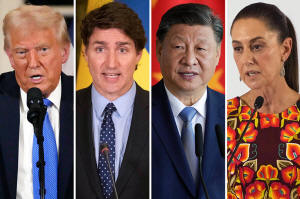US tariffs on Canada and Mexico take effect, as China takes aim at US
farm exports
[March 04, 2025] By
JOSH BOAK, PAUL WISEMAN and ROB GILLIES
WASHINGTON (AP) — President Donald Trump’s long-threatened tariffs
against Canada and Mexico went into effect Tuesday, putting global
markets on edge and setting up costly retaliations by the United States’
North American allies.
Starting just past midnight, imports from Canada and Mexico are now to
be taxed at 25%, with Canadian energy products subject to 10% import
duties.
The 10% tariff that Trump placed on Chinese imports in February was
doubled to 20%, and Beijing retaliated Tuesday with tariffs of up to 15%
on a wide array of U.S. farm exports. It also expanded the number of
U.S. companies subject to export controls and other restrictions by
about two dozen.
Canadian Prime Minister Justin Trudeau said his country would slap
tariffs on more than $100 billion of American goods over the course of
21 days. Mexico didn't immediately detail any retaliatory measures.
The U.S. president's moves raised fears of higher inflation and the
prospect of a devastating trade war even as he promised the American
public that taxes on imports are the easiest path to national
prosperity. He has shown a willingness to buck the warnings of
mainstream economists and put his own public approval on the line,
believing that tariffs can fix what ails the country.
“It’s a very powerful weapon that politicians haven’t used because they
were either dishonest, stupid or paid off in some other form," Trump
said Monday at the White House. "And now we’re using them.”
The Canada and Mexico tariffs were supposed to begin in February, but
Trump agreed to a 30-day suspension to negotiate further with the two
largest U.S. trading partners. The stated reason for the tariffs is to
address drug trafficking and illegal immigration, and both countries say
they've made progress on those issues. But Trump has also said the
tariffs will only come down if the U.S. trade imbalance closes, a
process unlikely to be settled on a political timeline.

The tariffs may be short-lived if the U.S. economy suffers. But Trump
could also impose more tariffs on the European Union, India, computer
chips, autos and pharmaceutical drugs. The American president has
injected a disorienting volatility into the world economy, leaving it
off balance as people wonder what he’ll do next.
“It’s chaotic, especially compared to the way we saw tariffs rolled out
in the first (Trump) administration," said Michael House, co-chair of
the international trade practice at the Perkins Coie law firm. "It’s
unpredictable. We don’t know, in fact, what the president will do.’’
Democratic lawmakers were quick to criticize the tariffs, and even some
Republican senators raised alarms.
Sen. Susan Collins, R-Maine, said she’s “very concerned” about the
tariffs going into effect because of her state’s proximity to Canada.
“Maine and Canada’s economy are integrated,” Collins said, explaining
that much of the state’s lobsters and blueberries are processed in
Canada and then sent back to the U.S.
The world economy is now caught in the fog of what appears to be a trade
war.
Even after Trump announced Monday that the tariffs were going forward,
Canadian officials were still in touch with their U.S. counterparts.
“The dialogue will continue, but we are ready to respond,” Canadian
Defense Minister Bill Blair said in Ottawa as he went into a special
Cabinet meeting on U.S.-Canada relations. “There are still discussions
taking place.”
[to top of second column] |

This combination of file photos shows, from left, U.S. President
Donald Trump in Palm Beach, Fla., Feb. 7, 2025, Canadian Prime
Minister Justin Trudeau in Kyiv, Ukraine, June 10, 2023, China's
President Xi Jinping in Brasilia, Brazil, Nov. 20, 2024, and
Mexico's President in Mexico City, June 27, 2024. Claudia Sheinbaum
(AP Photo)
 Shortly after Blair spoke, Trudeau
said Canada would impose 25% tariffs on $155 billion Canadian ($107
billion U.S.) worth of American goods, starting with tariffs on $30
billion Canadian ($21 billion U.S.) worth of goods immediately and
on the remaining amount on American products in three weeks.
“Our tariffs will remain in place until the U.S. trade action is
withdrawn, and should U.S. tariffs not cease, we are in active and
ongoing discussions with provinces and territories to pursue several
non-tariff measures,” Trudeau said.
The White House would like to see a drop in seizures of fentanyl
inside the United States, not just on the northern and southern
borders. Administration officials say that seizures of fentanyl last
month in everywhere from Louisiana to New Jersey had ties to foreign
cartels.
Damon Pike, technical practice leader for customs and trade services
at the tax and consulting firm BDO, suggested the responses of other
countries could escalate trade tensions and possibly increase the
economic pressure points.
“Canada has their list ready," Pike said. "The EU has their list
ready. It’s going to be tit for tat.’’
The Trump administration has suggested inflation will not be as bad
as economists claim, saying tariffs can motivate foreign companies
to open factories in the United States. On Monday, Trump announced
that Taiwan Semiconductor Manufacturing Company, the computer
chipmaker, would be investing $100 billion in domestic production.
Still, it can take time to relocate factories spread across the
world and train workers with the skills they need.
Greg Ahearn, president and CEO of The Toy Association, said the 20%
tariffs on Chinese goods will be “crippling” for the toy industry,
as nearly 80% of toys sold in the U.S. are made in China.
“There’s a sophistication of manufacturing, of the tooling,” he
said. “There’s a lot of handcrafting that is part of these toys that
a lot of people don’t understand … the face painting, the face
masks, the hair weaving, the hair braiding, the cut and sew for
plush to get it to look just so. All of that are very high hands,
skilled labor that has been passed through generations in the supply
chain that exists with China."
For a president who has promised quick results, Ahearn added a note
of caution about how quickly U.S. factories could match their
Chinese rivals.
"That can’t be replicated overnight,” he said.
___
Gillies reported from Toronto. Associated Press writers Anne
D’Innocenzio in New York and Lisa Mascaro in Washington contributed
to this report.
All contents © copyright 2025 Associated Press. All rights reserved
 |